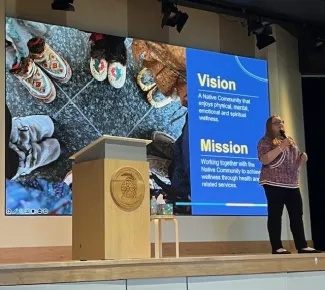Centering Relationships in Healing: How an Alaskan Health System is Transforming Care Through Trust, Culture, and Community
Summary
- Southcentral Foundation’s Core Concepts training demonstrates how relationship-based care, rooted in trust, culture, and community, transforms health systems and redefines healing.
Lessons from Southcentral Foundation’s Core Concepts
I had the privilege of attending the Southcentral Foundation’s (SCF) Nuka Conference and Core Concepts training in Anchorage, Alaska earlier this year. SCF’s unwavering commitment to relationship-based care was evident in every detail, from how teams engage with one another to how they partner with the people they serve, the customer-owners.
Southcentral Foundation, a member of IHI’s Leadership Alliance, is an Alaska Native–owned nonprofit health care system serving nearly 70,000 Alaska Native and American Indian people in Anchorage and the surrounding areas. Over the past two decades, SCF has led a full system transformation, centering Alaska Native people in the design and delivery of care. Their model is grounded in quality, adaptability, and shared accountability between providers and customer-owners.
The Core Concepts Experience
Core Concepts training was one of the most impactful parts of my visit. The experience is designed to help participants deepen self-awareness, build authentic connections, and practice relationship-based approaches to communication and care. Far more than a workshop, it is an immersion into the principles that guide SCF’s system of care.
Through exercises, storytelling, and honest dialogue, Core Concepts emphasizes that:
- Relationships are the foundation of healing and health. At SCF, being in relationship is central not only to workforce strategy but also to the design and delivery of care. Trust, respect, and shared decision-making aren’t add-ons — they are core strategies for improving outcomes.
- Culture and community are strengths to be centered, not barriers to be worked around. Alaska Native values are intentionally woven into SCF’s systems, creating belonging and purpose for both staff and customer-owners.
- Leadership happens at every level. Core Concepts reinforces that everyone has a role in co-creating a better system. SCF’s emphasis on personal responsibility and shared vision is both empowering and humbling.
- Healing is holistic. The training underscored that emotional, spiritual, and cultural health are inseparable from physical health, and that systems must be designed accordingly.
Why This Matters
The Core Concepts training did more than describe these principles; it gave me the chance to practice them. It reminded me that relationship-based care is not a theory but a discipline, one that requires constant attention, humility, and intentionality.
I left Anchorage inspired, challenged, and renewed in my sense of what health care can become when rooted in trust, culture, and community. For IHI’s global improvement community, this feels like a particularly timely moment. As primary care emerges as a growing area of focus, the lessons from SCF’s Core Concepts provide a roadmap for how boards, leaders, and teams can more deeply embed relationship-based care into strategy and practice.
IHI’s partnership with SCF offers not just a chance to learn about a model, but to experience what it feels like to place relationships at the center of health care.
To learn more about Southcentral Foundation’s relationship-based approach and Core Concepts training, join us at the 2025 IHI Forum for the following sessions:
- Spotlight Session 2: From Development to Resilience: Workforce Systems That Deliver
- D15: Treat Me as a Whole Person: Customer-Owned and Relationship-Based Services at Alaska’s Nuka System
Jill Duncan, RN, MS, MPH, is a Vice President at the Institute for Healthcare Improvement (IHI).
Photos by Jill Duncan
You may also be interested in:
- Learn more about the Leadership Alliance and how to become a member
- Register to attend the IHI Forum
- “Relationships Eat Culture for Breakfast” and Other Safety Leadership Lessons

